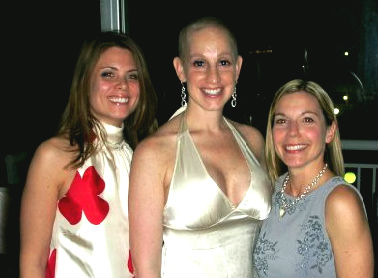There is no manual to this cancer thing. I quickly learned that I would have to be my own best advocate. In my case, my primary healthcare physician wasn't involved in the course of my cancer treatment. Maybe my situation was atypical, given that my radiologist was the father of a close friend. I had been diagnosed with breast cancer and the pathology report was faxed to my primary physician's office, but then what? I didn't know what to do first, so I started with a call to the office of my primary physician. "Hi, I'm a patient of Dr. So-and-So. Apparently, I have cancer. What should I do?" I never did speak to the doctor, only the office staff member who answered the phone and responded, "Well, we usually refer people to Dr. M." I then said, "Um, OK, can you give me his number? Should I look it up?" I thought, "Are you kidding me? I was just diagnosed with cancer, and I'm pulling teeth to get a number a medical oncologist to whom I'm being referred? This is not OK."
I have a little bit of experience in healthcare, just enough to be dangerous. I have a master's degree in health administration, worked as a healthcare consultant for several years, and before that, I worked for a company that contracted with insurance companies to provide professional support services and information to their members diagnosed with cancer. Even with my professional and educational background, I was still momentarily paralyzed by fear, but I had to pull it together and get my ducks in a row quickly. Cancer was scary for me.
Since it was my body and ultimately my decision how I was going to proceed based on the information obtained from a number of doctors, I "interviewed" my physicians. I personally wanted to act swiftly and not be in and out of surgeries. I talked to a friend in the healthcare field, who suggested a multidisciplinary approach might be more attractive to me. This is how I was able to get the opinion of a group of specialists and feel more confident that I had explored all of my options. I asked a lot of questions. I wanted to know what to expect, the good, the bad and the ugly. I thought, "Give it all to me now so there are no surprises." That's what I needed to feel in control, but it's a mindset that might not work for others who respond better to a 'need to know' basis. I met with a fantastic team of doctors and, through a friend, was referred to a wonderful surgical oncologist, who was the only doctor to discuss preservation of my fertility, given my age and other factors - such as chemotherapy and BRCA1 mutation status. She also led me to a fantastically skilled plastic surgeon. I always kept in the forefront of my brain, "This is my life. These are my choices, but I need help in order to make the best decisions I can based on the information I obtain." There is no manual to this cancer thing.





